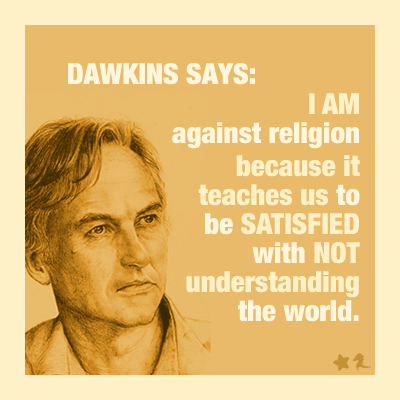I stole this image from Marc Barnes' blog. I wanted to go a different direction with it than he does. Dawkins is unintentionally insightful here. He describes well what he wants and what we all want in a world and life view. What he has that many religious people he knows seem to be missing. The trouble is he assumes that his hunger to understand the world comes from his atheist creed and other people's perceived satisfaction with a lack of understanding comes from their religious creed. Quite the opposite is the case. Why does an atheist want to understand the world? I would suggest that the reason does not flow from atheism. It is borrowed from Christianity. You know why Christians want to understand the world. Understanding creation means understanding the creator. That brings us into fellowship with God which is the ultimate goal of man.
But why does an atheist want to understand the world? If he dies with a head full of knowledge he still dies. Why put in the effort? Isn't power or pleasure more important than knowledge? If you can shout down your opponents then why does it matter if they have a true understanding of the world and you don't? Dawkins does not see himself this way. He thinks he has the truth. Many have said he does a lot more shouting than he does reasoning. But he does value reasoning and likes to think of himself as a pursuing actual truth. But why do that?
Think of Martin Luther. He opposed the pope as a way of pursuing truth. He believed he had the real truth about God and the church was teaching error. Then Henry VIII embraced Luther's rebellion against the pope but he didn't care so much about truth. He likely convinced himself he was right but it was basically a power grab. He convinced the English bishops to support him by executing St Thomas More and St John Fischer. He didn't need to make a theological argument. Why should the next atheist that comes along care about science? Why not just use force to shut up the scientists? There is nothing in atheism that makes that inconsistent.
Even more simply, an atheist could just decide science is hard work. He might have the ability to be a good scientist or engineer or doctor or whatever. Why put in the time? Why not pursue wine, woman, and song instead? If we are not going to be held accountable for our choices then what is the upside to all that learning? You could impress more people by learning trivia. There are easier ways to make money. Why shouldn't I be satisfied with not understanding the world to the degree I could?
Then there is the deeper question of whether there is even an actual truth to be understood. Dawkins thinks there is. He would accept that either God exists or He does not. That one should use reason to discern which of those possibilities is actually true. Many people disagree with that. They would say objective truth either does not exists or is unknowable. To me that seems like being satisfied with not understanding the world. If you say truth exists and is knowable, which religious people do, then you will try and separate truths from falsehoods.
The issue Dawkins has is the Christian does not limit his reason and his data to science. He looks at divine revelation. He looks at philosophy and art. He tries to put it all together into one big worldview. Now that is a very different way of thinking of the world. It is hard to see why he would interpret that as being OK with not understanding the world. He might be referring to some Christians denying evolution. Not sure what other example he could give. Generally religious people do not deny scientific truth.

No comments:
Post a Comment